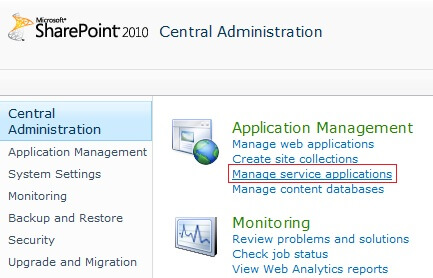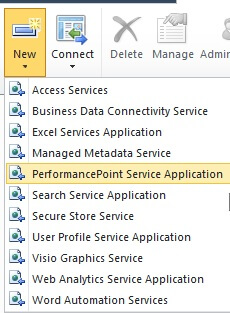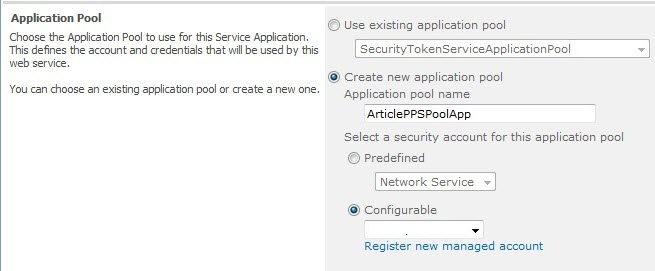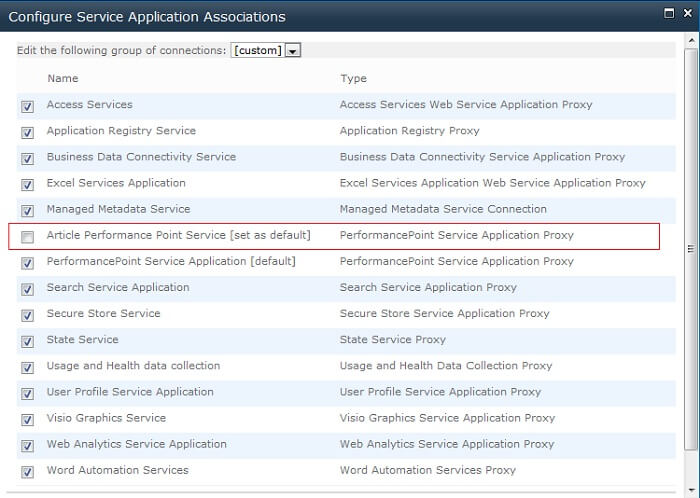By: Siddharth Mehta | Updated: 2011-04-12 | Comments | Related: > SharePoint
Problem
PerformancePoint used to be an independent product with the 2007 version. In SharePoint 2010, PerformancePoint has been integrated in the form of PerformancePoint services. But in order to effectively use PerformancePoint services in SharePoint 2010, it should be properly configured with appropriate service applications and a proxy pointing to it.
Solution
In the last article, we saw how to create a secure store service and turn the PerformancePoint service on. In this article we will discuss the following points:
1) Creating and configuring the PerformancePoint service application.
2) Relating the web application with the created service application.
To create and configure the PerformancePoint service application, Select Start -> All Programs -> Microsoft SharePoint 2010 Products -> SharePoint 2010 Central Administration. Click "Manage Service Applications" under Application Management.

By default every web application takes the default service application, but for our purpose we need to create a new PerformancePoint service application. On the ribbon, Click onthe Arrow below "New" and select "PerformancePoint Service Application".

Enter an appropriate application name. In the "Application Pool" area, we can create a new application pool or choose an existing one. For our purpose, we will create a new application and configure it with an appropriate security account. We need to make sure the service account has sufficient rights on all data sources as well as network sources. After filling in all details, click on "Create".

A PerformancePoint service application will be created, which in our case is "Article Performance Point Service". We need to set up an unattended service account so that we can use a single shared account to access external data source. To do so, Select "Article PerformancePoint Service" and click on "Manage" on the ribbon.

There will be several options such as defining the trusted data source location or content locations, importing PPS content and others. For our purpose, Click on "PerformancePoint Service Application Settings".

By default the Secure Store Service name will be pre-populated. In order to configure the unattended account, provide an appropriate username and password and Click OK.

After the service application is created, we need to complete the last step of attaching the web application to the newly created service application. To do so, go back to "Application Management" in Central Administration. Under "Service Applications" click on "configure service application associations".

By default, the "default" connection will be selected. You can change it to "custom" and select all the service applications required for the web application including the custom PerformancePoint service application i.e. "Article Performance Point Service". You can even set the custom service application as the default PerformancePoint service application. After selecting all the required service applications, click OK, and web application associations will be updated.

You can cross check whether the PerformancePoint service application is properly configured by accessing PPS sites, Dashboard designer and other PPS first class objects in Business Intelligence Center Site. Before that, ensure to activate the PPS feature from Site Settings->Site Collection Features.
Next Steps
- Try to configure various PPS service application for different web application.
- Try to access external data source using configured service application via PPS Site.
About the author
 Siddharth Mehta is an Associate Manager with Accenture in the Avanade Division focusing on Business Intelligence.
Siddharth Mehta is an Associate Manager with Accenture in the Avanade Division focusing on Business Intelligence.This author pledges the content of this article is based on professional experience and not AI generated.
View all my tips
Article Last Updated: 2011-04-12






